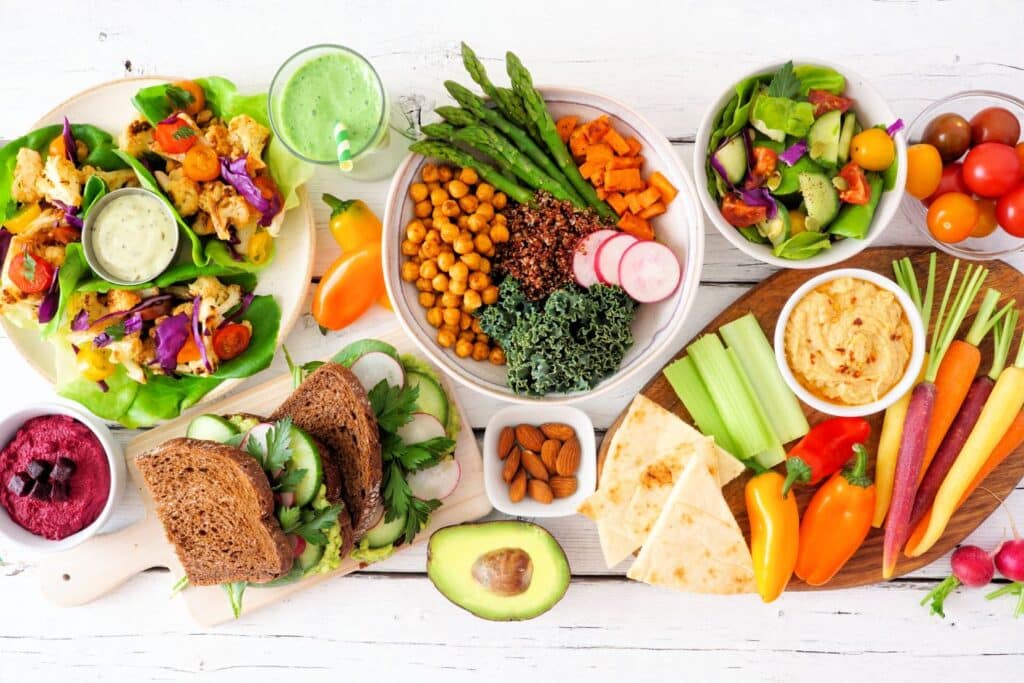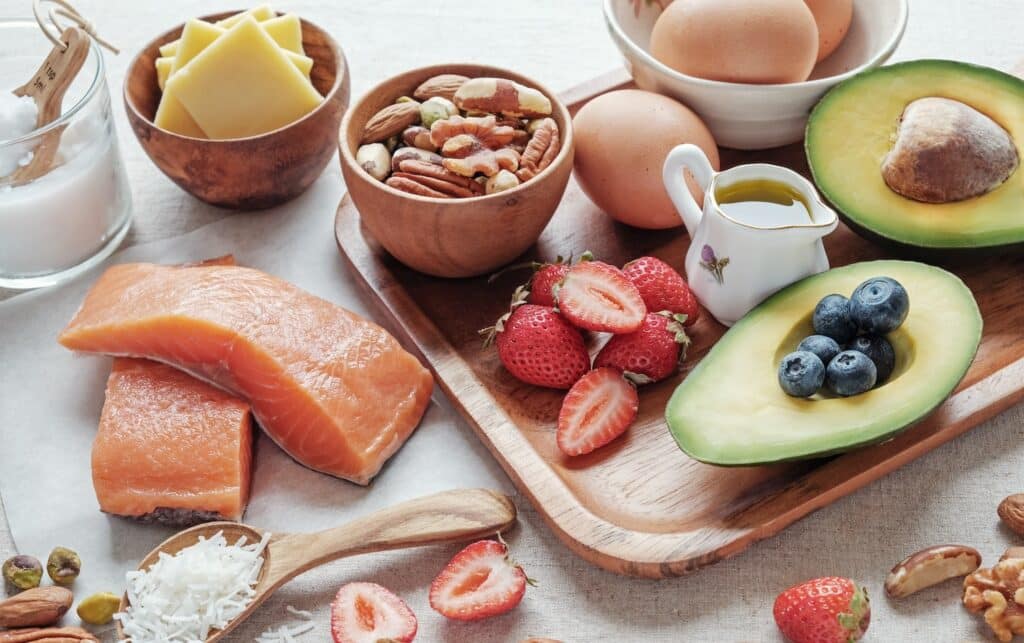You may already know that getting active may help your brain to grow and change. But it’s not just exercise that gives the brain a boost. Enter: foods for concentration.
There are also many foods that can also help mental performance. So, if you struggle to focus throughout the day, your diet may be contributing to the problem.
Does Your Diet Really Have an Impact on Focus and Productivity?
Your diet and your brain are intimately connected. Adding healthy foods to your meals and snacks can boost concentration and keep you alert. Of course, you can’t just reach for anything to eat—the specific food choices you make matter.
Registered dietitian and MyFitnessPal scientific advisor Erin Palinski-Wade suggests choosing meals that include both high-fiber slow-digested carbs and lean protein. Examples include chicken breast with broccoli or black beans with brown rice.

12 Foods For Improved Concentration
Lean proteins, healthy fats, leafy greens, vegetables, fruits, and nuts are all good brain food.
We asked Palinski-Wade to recommend 12 foods that have been shown to help sustain mental energy and improve concentration:
1. Eggs
Your body needs fuel after a night’s rest, and a recent study showed that high-quality protein in the morning can provide a boost of energy and concentration. Eggs are a perfect addition to high-protein breakfasts and contain all nine essential amino acids your brain and body need.
“Eggs also include choline,” says Palinski-Wade, “which plays a role in regulating memory, mood, and other cognitive functions.”
2. Chicken
Chicken is another brain-smart food containing all nine essential amino acids. Chicken breast is a lean protein, one of the best sources of this critical nutrient. Chicken breast contains B vitamins, zinc, and selenium, all known to support cognitive performance.
To get more chicken in your diet, try some of our favorite dietitian-approved recipes:
3. Greek yogurt
Yogurt is rich in B vitamins and may reduce inflammation, which may protect against cognitive impairment, according to preliminary research. Another study found an association between eating low-fat yogurt regularly and improved memory in men.
Yogurt also contains probiotics—a microorganism that some people call healthy bacteria—that live in the stomach and promote gut health. Multiple studies have even shown the impact of fermented foods on cognitive function.
4. Salmon
If you want to enhance your brainpower, consider heading to the seafood counter on your next grocery run.
“Salmon is an excellent source of protein and omega-3 fatty acids, which are essential for the brain and play a role in memory, concentration, and overall cognition,” says Palinski-Wade.
Because of these acids, fatty fish like salmon are known to encourage blood flow in the brain.
Check out these healthy salmon recipes for ideas on including more of this superfood into your diet.
5. Almonds
What’s better than a delicious, plant-based, protein-packed snack that requires zero prep and plays nice with others?
Almonds can help you concentrate because of their protein content without the sugar that can drag you down.
They also contain antioxidants, fiber, and good fat, balancing blood sugar.
6. Lentils
This plant-based protein is packed with complex carbohydrates. These slowly break down and convert to fuel, providing a steady supply of glucose to the brain. The fiber in lentils also helps regulate blood sugar, helping you avoid energy crashes.
Lentils are easy to overlook if you don’t know how to cook and use them. If that’s you, we’ve got you covered.
Check out these dietitian-approved, lentil recipes:
7. Quinoa
Quinoa is a whole grain and another brain-friendly food that gets forgotten. Just like lentils, quinoa is high in fiber and complex carbohydrates.
“This combination of nutrients helps maintain stable energy levels and mental focus throughout the day,” says Palinski-Wade.
One of the best things about cooking with quinoa is its versatility. Add it to chili, tabbouleh, soup, or any salad for a nutrient upgrade and brain boost.

8. Pistachios
Emerging research suggests that incorporating pistachios into the diet may have several potential benefits for brain health, including better cognitive function and less anxiety.
Researchers think it may be the beneficial flavonoids found in pistachios, along with fat-soluble antioxidants, that contribute to improved cognitive performance.
Pistachios can also help maintain blood sugar balance, preventing the blood sugar crashes that can take you out of the concentration zone.
Studies also suggest these nuts can play a role in lowering blood pressure, which a research team at Johns Hopkins University found is linked to cognitive decline.
Pack a handful in a ziplock as a delicious treat that can help keep you on track.
9. Cottage Cheese
You may have noticed cottage cheese is making a comeback in health-conscious circles, and for good reason.
“Some brands are fortified with vitamin D, a nutrient that makes acetylcholine, a key neurotransmitter that regulates memory, mood, and other cognitive functions,”
Cottage cheese also has plenty of protein, and research suggests that getting enough protein in your diet may play a role in keeping you sharp and focused as you age.
10. Edamame
If you’re looking for smart food, reach for some soybeans. A 2020 study suggests that soy isoflavones–like those found in edamame–may improve memory and overall brain function.
Oh, and did we mention that steamed edamame are delicious? Sprinkle a pinch of salt to enhance their flavor, and include them in your snack rotation for a tasty treat.
11. Spirulina
Spirulina has multiple benefits. It has anti-inflammatory and antioxidant effects. In preliminary animal studies, it’s been shown to boost learning and memory while guarding against cognitive decline.
You’ll usually find the nutrient-dense plant in powdered form, making it easy to add a pinch to your morning smoothie or latte for a brain boost.
12. Coffee
A cup of Joe is the go-to for work and study breaks for a reason. “In small amounts, caffeine can be beneficial and may help to boost alertness,” Palinski-Wade says.
Keep in mind, more is not more when it comes to coffee. The FDA recommends no more than 400mg of caffeine per day (about three to four 8-ounce cups of coffee) to avoid any unwanted side effects. Beyond that, stick to decaf.
Frequently Asked Questions
What Foods Are Bad for Concentration?
One of the biggest culprits is sugar. Although it can boost energy for a short time, sugar can make it difficult to focus.
“Excess sugar can actually be detrimental to learning and memory,” warns Palinski-Wade.
Here’s what to avoid for better concentration:
- Sugary snacks and drinks: Candy, cookies, pastries, sodas, and energy drinks cause increases in blood sugar followed by a sudden crash.
- Refined carbohydrates: White bread, pasta, and cereals quickly break down into sugar once you eat them, affecting your cognition.
- Ultra-processed foods: The unhealthy fats, sugars, and additives in fast food, packaged snacks, and ready-made meals can lead to sluggishness (brain fog) and cognitive decline.
- Saturated fats: Even a single meal loaded with saturated fat might make it tougher to think and focus according to some Ohio State research.
Fasted vs. fed: Which one is best for concentration?
Fitness buffs argue about whether you should exercise in a “fasted” state (like in the morning before breakfast) or while “fed” after a meal. But when it comes to a mental workout like studying for an exam or preparing a presentation at work, there is no debate.
“I definitely recommend being in a fed state when it comes to learning, memory, and productivity,” says Palinski-Wade. “The brain needs fuel for optimal performance, and balanced blood sugar from a steady energy source is key for mental clarity, thinking, and memory … all of which can impact productivity.”
So next time you need to focus, make sure to eat a healthy meal first as part of your nutritious diet.
The role of meal timing: Does it affect your ability to focus?
One study suggests that when you eat is just as important as what you eat when it comes to your ability to focus and concentrate.
“In the morning, the brain needs hydration and glucose to function at its peak. This is how eating a balanced breakfast helps provide the brain with a steady supply of glucose for sustained energy and focus,” says Palinski-Wade.
The timing of your evening meal matters as well. “Finish dinner about three hours before bedtime to improve sleep quality, which is crucial for maintaining focus and productivity the next day,” she adds.
When it comes to mental performance, you shouldn’t underestimate the importance of a nutritious breakfast.
Fun Fact: MyFitnessPal Premium offers members the ability to track their meal timing with the Food Timestamps feature! This feature allows them to learn how when they eat can impact their energy, workouts, and more. Learn more or try a FREE 30-day Premium trial
To snack or not to sack: What will help you focus more?
It’s tempting to reach for an energizing snack when you’re gearing up to use your brain or when your focus is fading in the middle of a difficult task. And a bite could be helpful, according to Palinski-Wade.
“The right snack may enhance focus and productivity. It can prevent dips in blood sugar, which makes it harder to focus.”
However, snacks should be well-balanced to promote slow-digested energy for steady concentration.
Palinski-Wade suggests you nibble on a handful of almonds and a piece of fruit instead of sugary vending machine snacks like a candy bar.
The Bottom Line: The Right Foods Can Boost Focus
Just like your body needs food for strength to move, your brain needs it for memory, creativity, problem-solving, and focus.
For a brain-healthy diet, experts recommend fruits and vegetables, leafy greens, fatty fish, nuts, legumes, and whole grains. With some planning, you can incorporate these ‘good brain foods’ and their positive effects into your meals.
And apps like MyFitnessPal can help.
Whether you swear by counting macros or prefer to receive weekly reports that give you a sense of your habits, you can include foods in your diet to boost concentration. You can even customize your nutrition goals and make your own recipes to create a diet that’s tailor-made to help you focus.
Regardless of how you plan and organize your meals, one thing is clear: What you eat matters. So try strategically adding foods for concentration and brain health to your diet. It could go a long way toward keeping you sharp and mentally agile for years to come.

